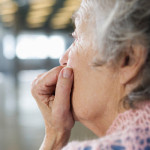 • Elder abuse, say Yuliya Mysyuk and colleagues, is a “far reaching public health problem that affects the quality of life of people worldwide,” and point to failures in health systems, rather than to individuals, as the reason for its prevalence. Healthcare professionals, they say, are one of the most important groups to identify abuse. Yet this is underreported and older people remain let down by the system. Mysyuk suggests that their voices should be deliberately sought when restructuring healthcare systems, and that proposes “adding system abuse—harm or distress to an older person that is caused by the organisation and resulting practices in our institutions —to the classifications of abuse.”
• Elder abuse, say Yuliya Mysyuk and colleagues, is a “far reaching public health problem that affects the quality of life of people worldwide,” and point to failures in health systems, rather than to individuals, as the reason for its prevalence. Healthcare professionals, they say, are one of the most important groups to identify abuse. Yet this is underreported and older people remain let down by the system. Mysyuk suggests that their voices should be deliberately sought when restructuring healthcare systems, and that proposes “adding system abuse—harm or distress to an older person that is caused by the organisation and resulting practices in our institutions —to the classifications of abuse.”
• Failures of systems rather than individuals, and calls for change, were also echoed by a warning from the royal nursing and medical colleges in Scotland, who have come together to issue a warning on the future sustainability of the NHS. They say new ways must be found to deliver the service in Scotland and have issued a statement requesting a frank public debate on all available options; “an end to targets that distort clinical priorities and waste resources; development of new ways to deliver care that replace the traditional hospital based model; and better team working among all health professionals.”
 • Meanwhile Douglas Kamerow, senior scholar at Georgetown University, points out that action by both individuals and healthcare professionals is needed to tackle the growing number of people who do no exercise at all. In an column titled “Why don’t people exercise, even a little?” he suggests individuals come up with exercise strategies which work for them, and that doctors help them to do so. Whilst accepting that research has shown counselling for exercise isn’t wholly effective, he is adamant that “common sense and public health urgency demand that we do something.”
• Meanwhile Douglas Kamerow, senior scholar at Georgetown University, points out that action by both individuals and healthcare professionals is needed to tackle the growing number of people who do no exercise at all. In an column titled “Why don’t people exercise, even a little?” he suggests individuals come up with exercise strategies which work for them, and that doctors help them to do so. Whilst accepting that research has shown counselling for exercise isn’t wholly effective, he is adamant that “common sense and public health urgency demand that we do something.”
Rebecca Winson is a publishing executive, The BMJ.